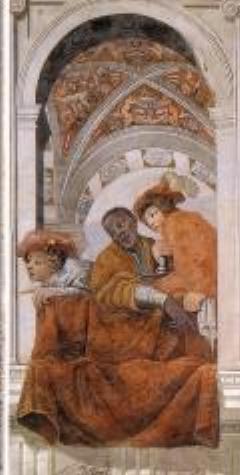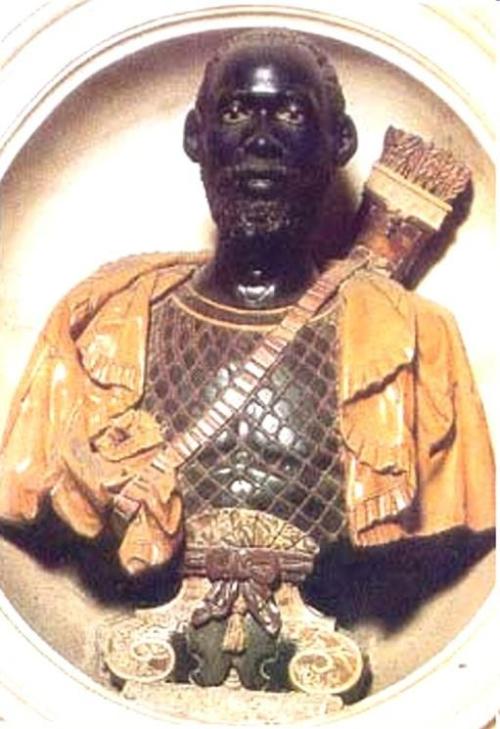Portugese-African Relations
1452: Pope Nicholas V issues a bull authorizing the King of Portugal to make war on the infidels, to conquer their lands, and enslave their natives. Origins of the Curse of Ham. - Dogs of God 116
1479-1480: The Treaty of Alcacovas is signed between Spain and Portugal ending the War of Succession. It is later strengthened giving Portugal sole rights to "discoveries" made on the African coast. - Dogs of God 120
1481: Pope Sixtus IV gives Portugal's Southern Exploration initiatve his blessing through a papal bull called Aeterni regis. It granted sovereignty over "whatever lands and islands shall be found...in the vicinity of Guinea (Africa)." - Dogs of God 120
1482: Kongolese monarchs begin hearing reports of strange ships off the coast of West Africa. These ships surely belonged to Portugese and Genovese sailors and explorers. This marks Portugals first contact with the Kongo Kingdom. - When We Ruled 344
1485: Portugal returns and the two nations exchange envoys. Portugal leaves 4 Christian missionaries (or Inquisitors) at the Kongo court and 4 Mpinda (Kongolese) nobles return with Diogo Cao to Portugal. - When We Ruled 344
1495: Manuel I comes to the throne in Lisbon, Portugal
1508: First slaves are sent to Manuel I as a payment for the Christianization programs.
1512: Portugeuse Regimento is issued by Manuel I as their Kongo policy. The slave trade begins in earnest. - When We Ruled 345
Commentary: One cannot understand slavery without first understanding the political, social, and extremely religious enviroment of 15th century Portugal during the Inquisition. The slave trade started with Portugal and its relationship with the Kingdom of Kongo. During the 15th century (but not limited to it), there was an obsession in Europe with discovering the fabled Christian kingdom of Prestor John. This gave rise to a multitude of navigators and explorers who were determined to circumnavigate Africa in search of this mythic land. Discovering the land of Prestor John wasn't the sole purpose of Portugese explorers though, it was also economic and religious. Word of West Africa's immense wealth was surely known throughout elite society in Europe (specifically Spain, Portugal, and Genoa) and by the late 15th century there was clearly an intent to acquire this wealth. By 1492, gold from Ghana supplied almost half of Portugal's monetary power. This may explain why Popes Nicholas V and Sixtus IV gave Portugal so much authority, essentially a colonial authority. But I disagree that Kongo (Angola) was a technical colony of Portugal as it is commonly referred to as. I'll comment on this later though. Until Manuel I issues the Regimento, Portugal's experience with the Kingdom of Kongo appears to be simply an exploratory one. Some Kongo nobles were even taken to Portugal and taught the native language and showered with gifts. This appears to have been an early ploy to learn more about the geography of Kongo though. But between 1495 and 1512, several Kongolese royals are lured into converting to Christianity and with the Regimento it is implied that to be a good Christian nation, the Kongolese must take Christian names, Christian attire and allow Portugese ambassadors to "advise" the Kongolese king in "reforming" the Kongo court along Christian lines. To make matters worse, Manuel I said Kongo could pay for these programs by exporting copper, ivory, and slaves. The Kongolese agreed under the assumption that they were getting something beneficial out of the "alliance," on top of that the Regimento also labeled ALL Catholic kings as "brothers." This began the serious infiltration of Kongo by the Portugese and also their search for Africa's wealth through the spies they now had in the Kongolese court perpatrating as missionaries.
1526: Dom Affonso I (Christian King of Kongo) sends over 20 letters to Portuguese king Manuel I and his successor John III complaining that Portuguese traders and priests were causing a havoc in his land. Black women were being raped and assaulted and there were frequent slave raids where even nobles and members of the royal family were being taken. His pleas for help fell on deaf ears. - When We Ruled 350
1551: Slaves make up 1/10th of the population of Lisbon, Portugal...almost 10,000 people. Some were being taken to America by this time as well. - Inquistion: The Reign of Fear 90
1556: Civil war breaks out in Kongo between the slave-trading factions of the south in the province of Ndongo and the forces of the king of Kongo, Diogo I. The Portuguese aided boths sides of the war. Ndongo came out on top and became an indepedent state seperate from the Kingdom of Kongo.
Commentary: The relationship between Portugal and Kongo deteriorates very quickly after the 1520's. Dom Affonso I came into power viewing his kingdoms relationship with Portugal as positive it seems. He used Portuguese mercenaries in helping to quell a rebellion by his own brother (a non-Christian). Over the next few years, Affonso would request from the King of Portugal that Christianity be spread even further by sending more priests (Inquisitors) and technicians to build schools and churches. The Church of the Holy Cross was built in 1517 and the Church of Our Lady of the Victories was built in 1526, the same year he began sending letters for help from the Portuguese monarchs. These massive building projects surely increased the number of Portuguese immigrants by the thousands. The slave trading, which at first was an agreement between the two nations, seems to have been getting out of control of the Kongolese. By the mid-16th century, it seems Portuguese agents had infiltrated every aspect of Kongo society. Religious. Social. Administrative. It likely got so bad that Kongolese nobles may have been threatened that to challenge the spread of Christianity in their land would result in their families being thrown into slavery. That's speculation, but it makes sense as to why Kongo elites may have put up with this corrupt system for so long. By 1556, Portugal essentially controls Ndongo as a vassal state which may have led to the civil war.
1569: The Jaga, a semi-barbarian group, invades Kongo from the East and cause the social fabric of an already strained country to breakdown. - When We Ruled 351
1575: The Portuguese, likely from Kongo, launch a series of wars to capture Ndongo because they thought the new country contained silver mines. The wars would carry on to 1622.
1622: Ann Nzinga, the Ndongo royal sister, attends a peace conference with Portugal. Among other things, Nzinga demands that all Ndongo notables return to their former loyalty to Ndongo instead of Portugal. In return she would release Portuguese prisoners of war. The Portuguese agreed and immediatly broke the treaty by invading Kongo.
1623: Ann Nzinga becomes Queen and began making regional alliances to fight the Portuguese. She even made peace with the Jaga.
1624: Ndongo declared a free country
1629: Queen Ann Nzinga's forces and her allies capture Matamba from the Portuguese.
Conclusion: The battles fought between Kongo and Portugal are really telling. The Portuguese were not an invading force by any means. By 1622, when the Portuguese break the peace treaty, they had already been living in Kongo (Angola) for 140 years! Both sides knew each other very well and the Portuguese by no means ran over Ann Nzinga's forces. The Queen's army likely had gunpower weapons as well, so technologically both sides were even. Make no mistake, the Kongolese ran Portugal out of their country... they beat them. This shows a major shortcoming of Portugal, a country that was always a powerful naval Empire, not one with that strong of a land army. They were also still a minority, despite years of intermarriage (through choice or rape). This should not come as a surpirse though, early Portuguese accounts talk of a highly developed Kongo Kingdom. There was a monetary system, Kongo controlled a few vassal states itself, state-constructed roads with tolls, and the original Kongo Kingdom was the size of France and Germany combined! There were many ironsmiths in Kongo long before Portuguese contact who forged knives, weapons, and axes. They manufactured various textiles on par with those from Italy including satins, silks, taffeta, and velvet. The Portuguese didn't really bring anything to the table other than religion and maybe some crops Kongo didn't have access to from America. Other than that, I'd say Portugal's intentions were always malicious and Kongolese monarchs were mostly kept out of the loop it seems and told what they were doing was good. It seems though that many Portuguese got comfortable in Kongo and possibly a little envious. This is important to note when talking about slavery. African kingdoms (I'll talk about Benin next who also had contact with Portugal, but not on the same level as Kongo) did trade slaves to Europeans, but this was done under the powerful and deceitful arm of the Inquisition! That was the whole point of converting the leaders of nations like Kongo and Benin and not so much the people (as I'm sure there was a lot of resistance). It was to lock them into the Inquistional system. Religion was used by Europe as a control mechanism. Portugal basically wrote the book on how to conquer Africa. There's a reason the Scramble didn't occur until the 1880's. It took European powers hundreds of years through cultural (religious) influence and other destablizing measures (such as throwing African economies into depressions and pitting rival groups against each other) to soften Africa up before Europe was able to colonize en masse in the late 19th century! During the time of Kongo/Portugal relations, there were still too many powerful African empires that could hold their own and Europe was no where near as technologically advanced as they were during the late 19th century.
 to westerners
to westerners








